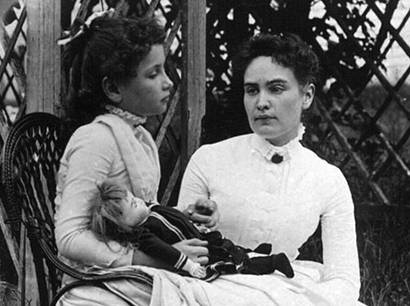This Week's Story
Helen Keller is disabled, but not defeated.

This Week’s Story relives American history and the Bible through brief inspiring stories presented on mp3 audio recordings and text for reading.
Helen Sees!
Helen cannot see; she cannot hear. Can she think using words we never heard her say? What is going on in her head?
Mom and Dad are afraid to discipline her. She’s wild! How does this new teacher, Anne Sullivan, expect to teach Helen? Anne is 20, a Northerner with poor eyesight, and has no teaching experience! Here she comes.”
As Anne came into the Keller’s living room, she took Helen’s hand. Helen jerked her hand away. Anne took it again. She began to finger spell the word for cake into Helen’s hand. Helen frowned and then grabbed Anne’s hand and exactly repeated the motions. Anne poked a piece of cake into Helen’s mouth. As yet Helen did not know that those motions she had imitated so quickly meant cake.
The first month after Anne’s arrival at the Keller’s home in Alabama was a frightful battle in endurance between Helen and Anne. Since having brain fever at nineteen months, Helen had been locked into a world where she was blind, deaf, and mute. Now she was nearly
seven. Why was this new person making demands of her? Helen’s desperation met its match in Anne’s determination to teach Helen. Within a month of Anne’s arrival, Helen understood that the motions Anne made into her hands represented objects she could touch. Her world of communication exploded with possibilities.
Anne had arrived at the Keller’s home in Alabama in March of 1887. Within six months Helen had learned 600 words using finger spelling. In three years she knew the alphabet, and could read and write in Braille. She noticed that people around her talked with their mouths, not their hands. At age ten she declared, “I want to talk with my mouth.” Sign language was not enough. How could she learn to talk, if she could not hear?
Anne took Helen to the Horace Mann School for the Deaf. There the principal, Ms. Fuller, gave Helen eleven lessons in speaking. During the first lesson Helen’s hand was placed lightly on Ms. Fuller’s face, in her mouth, and on her tongue. Helen felt how the tongue and lips moved when sounds were made. Helen tried to copy the movements. It was difficult. In following months she learned to speak, but her speaking was difficult to understand.
Helen graduated from Perkins Institute for the Blind, attended three more schools, and then was admitted to Radcliffe College at age 20. When Helen graduated from Radcliffe, she was the first known deaf blind person in the world to earn a Bachelor of Arts degree.
Anne Sullivan was close to Helen’s side for forty-nine years as teacher, helper, translator, and companion. These years included Anne’s home and school education, and activities as a world-famous speaker, author, and advocate for many causes, particularly the needs of people with disabilities. Some of her causes were radical and received criticism. She advocated the right of women to vote. She was a pacifist, a radical socialist, and a birth control supporter. Every American president from Grover Cleveland to Lyndon B. Johnson met her. Twelve of her books and many of her articles were published. She became the subject of books, films, and stage plays; and received many awards.
Helen’s story is more than a challenge to be determined or to be all that you can be. Her story suggests that no human being should be stereotyped as hopeless and left to darkness. Helen commented, “Every spiritual truth in the Bible, demands our faithful performance of every service essential to the health, enlightenment, and liberation of humankind.”
This is Barbara Steiner with a story of Helen Keller.
<< previous story] [next story >>
We invite your comments! [click here to comment]
This Week's Story is a non-profit supported by listeners. [click here to make a donation]
 click here to play audio
click here to play audio